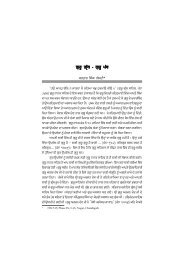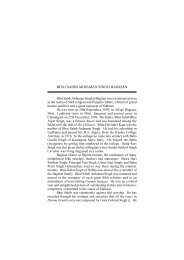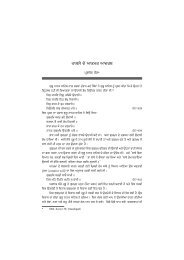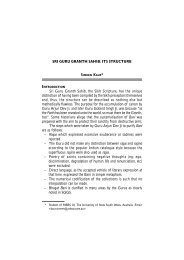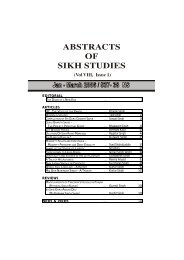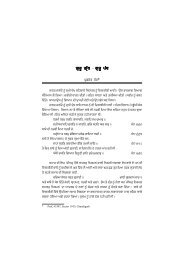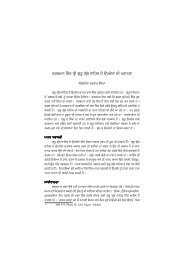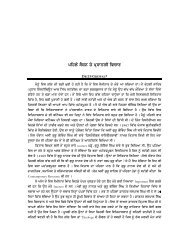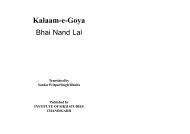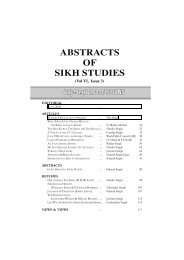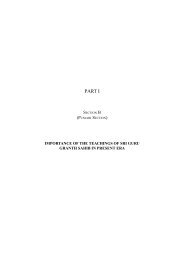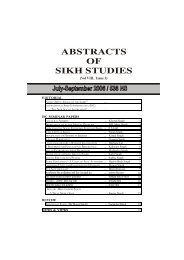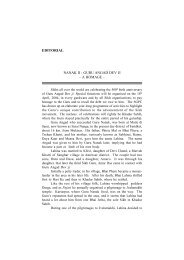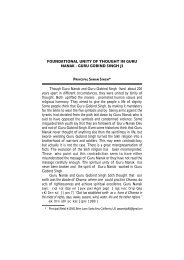editorial articles reviews news & views - Institute of Sikh Studies
editorial articles reviews news & views - Institute of Sikh Studies
editorial articles reviews news & views - Institute of Sikh Studies
You also want an ePaper? Increase the reach of your titles
YUMPU automatically turns print PDFs into web optimized ePapers that Google loves.
78<br />
ABSTRACTS OF SIKH STUDIES : APRIL-JUNE 2005 / 537 NS<br />
for the <strong>Sikh</strong>s <strong>of</strong> Gurdwara reform movement and others, perforce, he<br />
has to use the term martyrs, he is in lookout for terms to denigrate<br />
them, to keep himself in tune with his guide, McLeod.<br />
IV<br />
For the next four chapters, II to VI, Fenech confines himself to<br />
the main subject <strong>of</strong> <strong>Sikh</strong> martyrs.<br />
The second chapter <strong>Sikh</strong> Martyr Tradition : The Tradition and its<br />
Transmission opens with a Dhadi’s narration in June 1990 at Gurdwara<br />
Rakab Ganj, New Delhi. That gives Fenech the handle to say that<br />
similar presentation is made all over Punjab. “These provide an<br />
interpretation <strong>of</strong> <strong>Sikh</strong> history that pits dauntless courage against vile<br />
deception, truth and justice against tyranny and oppression, courage,<br />
defence, endurance, fearlessness, loyalty, altruism, and martyrdomthese<br />
are the traditions within <strong>Sikh</strong>ism which are today sung in the<br />
Dhadi tradition.” Then, Fenech makes a startling statement: “Within<br />
the present discussion the concern is not with history as it actually<br />
happened, but with history as it is popularly understood by the vast<br />
majority <strong>of</strong> <strong>Sikh</strong>s today” Though he does not spell out, he means that<br />
there is a vast difference between the two. Also, Fenech is not interested<br />
in deciphering the true history, but the spurious one, inspired by<br />
Brahminical infiltrators, as seen by McLeod and his school <strong>of</strong> thought.<br />
To them, “popular history” also comes from “comic books”. He quotes<br />
Dhadis to say that the <strong>Sikh</strong> soldiers, who fell in two world wars, or<br />
Indo-Pakistan wars, were martyrs. In that context, he cites <strong>Sikh</strong> jingle<br />
about Mir Mannu’s atrocities in 18th century, belittling misfortunes,<br />
as also Baba Dip Singh’s sacrifice, that a <strong>Sikh</strong> continues fighting even<br />
after being decapitated.<br />
The meaning <strong>of</strong> all these narrations is served by Fenech’s terming<br />
ordinary Punjabi dacoits being acclaimed as martyrs! Similarly, he terms<br />
“Bhagat Singh” and Udham Singh both <strong>of</strong> whom were executed as<br />
political terrorist.” Fenech does not know that even (Mahatma) M.K.<br />
Gandhi, whose name is universally mentioned for nonviolence, was at<br />
one time proclaimed by the British government as an extremist and a<br />
revolutionary, and could have earned that very approbation given to



